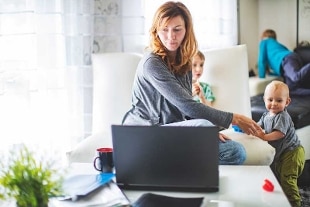Share
May 26, 2020 Italy has presented itself at the gates of an unprecedented emergency such as that caused by the coronavirus with over 6.2 million mothers with at least one minor child. Fewer and younger ones (the average childbirth age increases inexorably and in 2019 reaches 32.1 years, the highest rate in Europe), many of them are forced to give up their professional careers (between 25 and 54 only 57% of mothers are employed compared to 89.3% of fathers), cannot rely on an early childhood network (only 24.7% of children attend a socio-educational service for early childhood) and they often admit that they have changed some aspect of their working activity to try to reconcile work and private life (the choice of the reduction of working time concerned 18% of women and only 3% of men).This is the worrying picture that emerges from the Save the Children 'Le Equilibriste: maternity in Italy 2020' analysis released today, from which it is clear that the condition of mothers in Italy cannot overcome certain gaps, such as the very serious one of the load of care, which forces many of them to make a clear choice between work and family life. An already critical situation that has further worsened with the Covid-19 emergency, especially for the 3 million workers with at least one young child (under 15 years of age), around 30% of total employed workers (9 million 872 thousand). According to an analysis developed by Save the Children on the questionnaires administered by the Orlando Association to almost 1000 mothers, on the working front, mothers in the last period are increasingly "balanced": despite almost half of those interviewed (44.4% ) is continuing its working activity in an agile way, among these, only 25.3% have a room separate from their children and companions / husbands where they can work, while almost half (42.8%) are forced to share the workspace with family members. During this period, for 3 out of 4 mothers among those interviewed (74.1%) the load of domestic work increased, both for the care of children, elderly people at home, non self-sufficient people, and for activities daily housework (shopping, preparing meals, cleaning the house, washing machines, ironing).
Among those who have declared an increase in the domestic load, 43.9% report a strong increase, while 30.2% consider it to have increased slightly. Within households, however, mothers continue to have a clear feeling that everything '' weighs on their shoulders': only for one mother out of five the emergency situation represented an opportunity to rebalance the breakdown of care work and domestic with other people who live with her (19.5%). The measures introduced in March with the 'Cura Italià decree and renewed with the Relaunch Decree, which is now being discussed in the Chamber Budget Committee, also concerned a somewhat reduced audience of working parents: from the latest data available, only 242 thousand workers and workers have applied for the leave provided for parents with children aged 12 and under, even few requests for the babysitting bonus (alternative to leave) of a maximum of 600 euros, just over 93 thousand.
'Balanced mothers already before the Covid-19 emergency, those told by the report on the condition of mothers in Italy, who from North to South, with different conditions, find themselves having most of the family and children care load: many of them came home after a day's work away and looked after their home and family. Today there is no longer this space-time division and work and care overlap, aggravating an already very precarious balance. Even more precarious is that of women who live in conditions of socio-economic vulnerability. In another recent 40dB survey for Save the Children, it emerges that the burden of care in vulnerable families is on the shoulders of women, without the support of men: they are practically alone to take care of their children (51.7%), cleaning the house and washing clothes (80.2%), shopping (50.3%), cooking (70.5%).
'' With the start of phase three, the most penalized are likely to be working mothers, around 6% of the Italian population. With the failure to reopen early childhood services, many women, especially those with lower wages and employed in sectors where physical presence is needed, risk having to decide not to return to work, aggravating the already difficult situation of Italian female employment levels. . For those who will be able to work in smart working, there is a strong risk of an excessive load of work and care ', says Antonella Inverno, Save the Children policy manager for children. '' It is not only the closure of early childhood services that worries mothers - he underlines -, but also the management of distance education, which especially for primary schools, requires continuous support from an adult at home, and above all the management of the emotional load of the children, still forgotten by politics in the restart phase. An extraordinary plan for children and adolescents must be adopted as soon as possible, which focuses on the rights of minors, because families must not be left alone to face the educational and social challenges that the health crisis has set. ' From the analysis developed by Save the Children on the questionnaires administered by the Orlando association, as regards the main critical issues that mothers experienced in the forced isolation phase, the distance from their loved ones (in 21.7% of cases), the limitation of activities related to personal well-being (15.4%) and the weight of childcare work (14%), even prevailed on forced isolation (13.9%) and on the fear of contagion (11.3% ). Economic problems (8%), home conflicts (6.7%) and the risk of job loss (6.3%) are also worrying.

